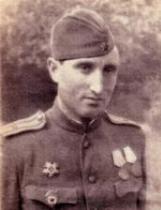Ikhil Falikman was born in 1911 in the town of Lyubar in the Volhynia Province (in present-day Zhitomir Region, Ukraine). He finished a 7-year Yiddish school there, and then moved to Kiev, where he studied at an art school. His first Yiddish short story, "Stepes shitn zikh", was published in the early 1930s in the Kiev journal Di royte velt [The Red World]. When the Soviet government came up with the idea of the Birobidzhan project to establish a "new Jewish homeland" in the Far East in the late 1920s and early 1930s, Falikman was one of the first to settle there. However, he did not live there long, because the climactic and general living conditions were very difficult. During his stay, Falikman worked on the staff of the local provincial newspaper Birobidzhaner shtern [Birobidzhan Star], which was issued in Yiddish and Russian. He also contributed to the almanac Birobidzhan.
In 1933, he returned to Kiev, where he wrote about life in the Soviet Far East. His book Tsvishn sopkes [Between Mountains], consisting of stories and essays about Birobidzhan, was published in 1937. Falikman's second collection, Onheyb friling [Begin, Spring!], which also dealt with the people of "the Jewish Autonomous Region" of Birobidzhan, appeared in 1940.
From the very first days of the war, which began with the Wehrmacht invasion of the USSR in late June 1941, Ikhil Falikman served as a military correspondent. He was on the editorial staff of the Newspaper Patriot Rodiny [Patriot of the Motherland], and contributed to the newspaper Na razgrom vraga [To Rout the Enemy]. His frontline sketches also appeared in the Yiddish newspaper Eynikayt [Unity], the organ of the Jewish Anti-fascist Committee.
Falikman wrote two books – Libe in fayer [Love in Fire] (published in 1943) and Mentshn fun mayn land [People of My Land] (1945) – dealing with the war. Major Falikman was awarded the Order of the Patriotic War, 2nd Class, and some medals.
After the war, Ikhil returned to Kiev. In 1948, during the period of Stalinist antisemitism in the USSR, a campaign against "cosmopolitanism" was launched. Falikman was arrested and spent six years in the Gulag. After his release, he resumed his literary activities.
In 1961, when the journal Sovetish heymland started publication in Moscow, Falikman became a member of its editorial staff, and published stories and sketches in it. His literary works were translated from Yiddish into Russian and Ukrainian. 1968 saw the publication of his novel Der shvartser vint [The Black Wind], which dealt with the subject to the Holocaust.
Ikhil Falikman died in 1977 in Kiev.







